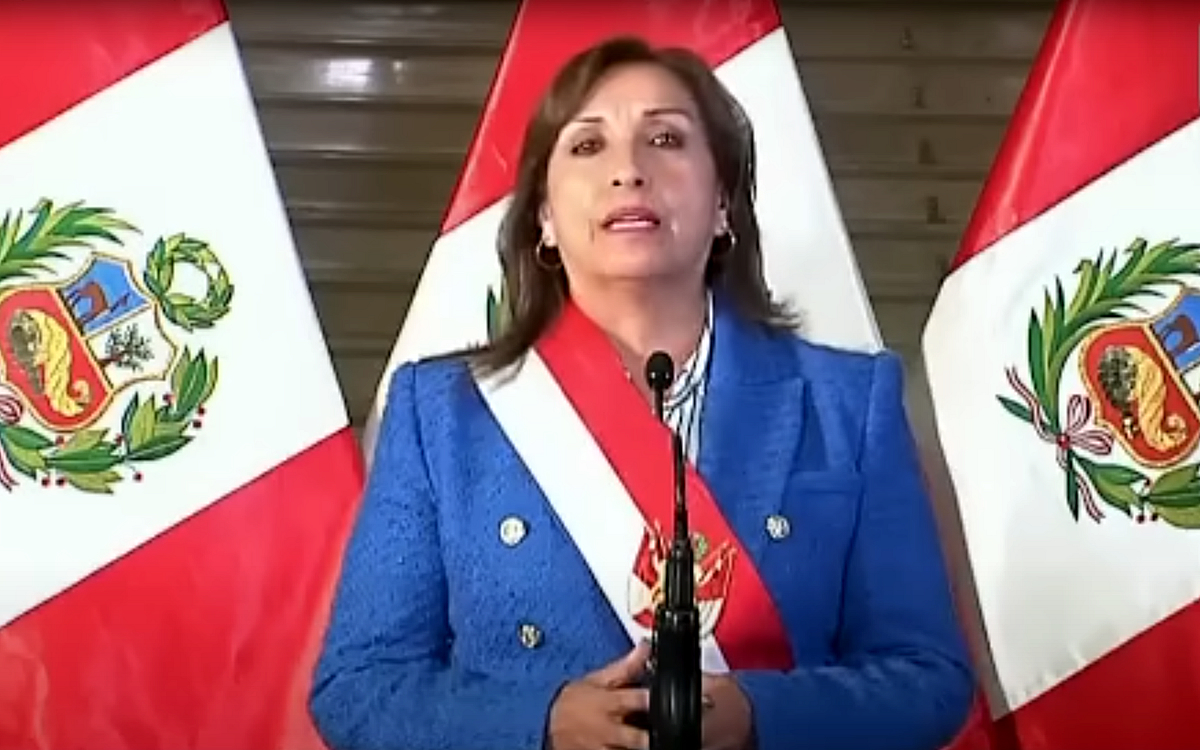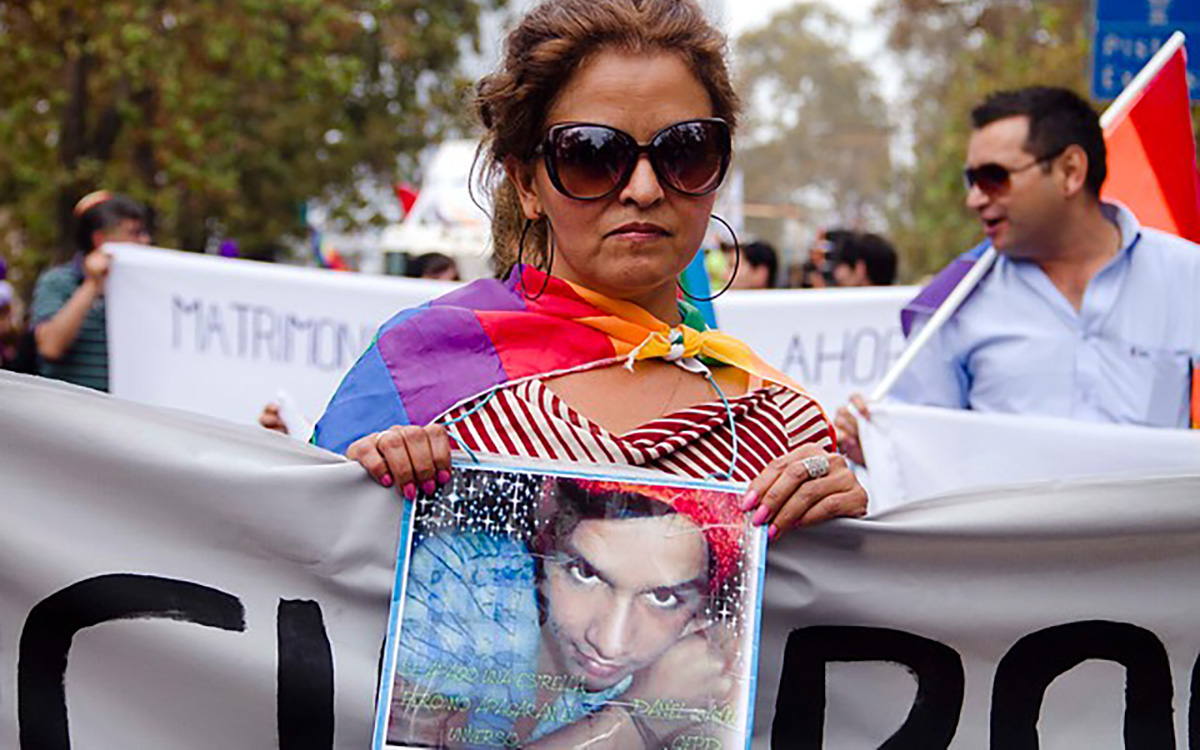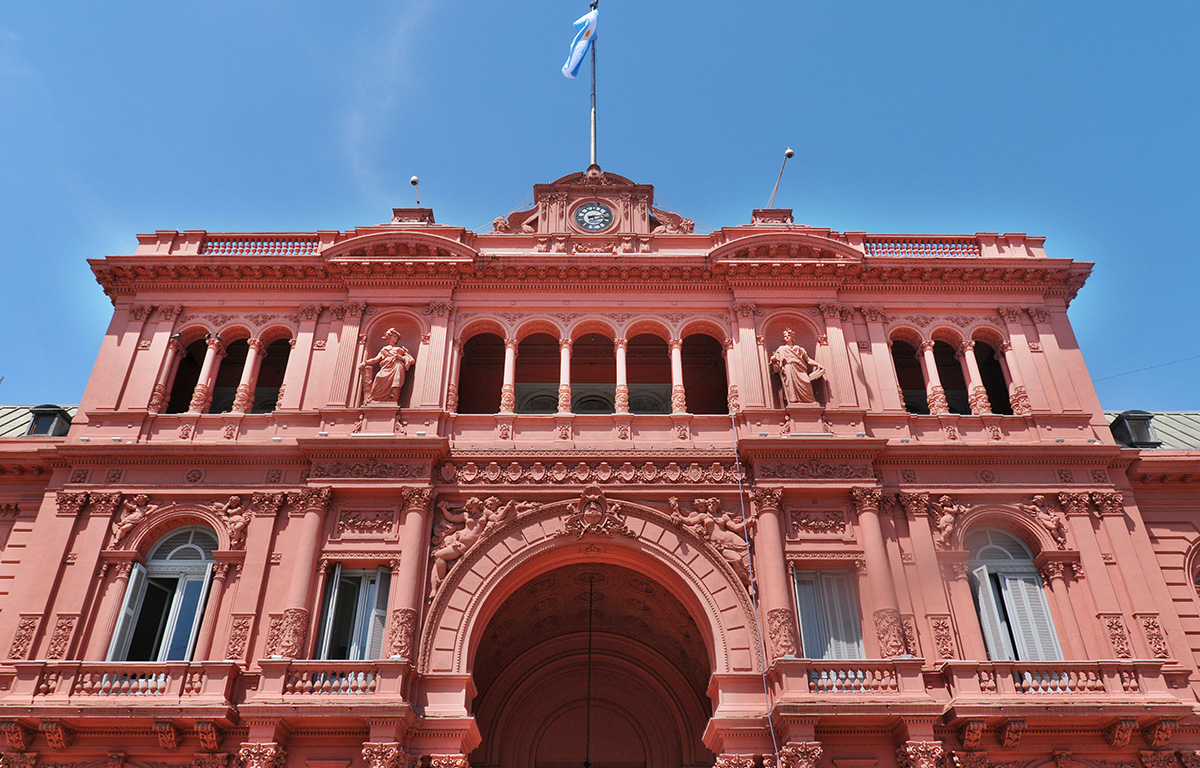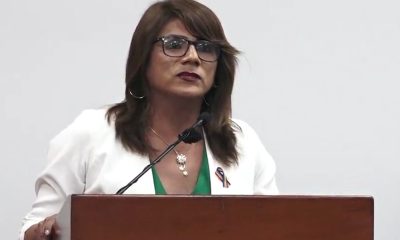South America
New Peruvian president’s views on LGBTQ, intersex issues unclear
Dina Boluarte succeeded Pedro Castillo after self-coup, impeachment

It has been a volatile week in Peru.
The country has a new president, Dina Boluarte, after former President Pedro Castillo’s attempted self-coup. But since Boluarte was sworn in, unrest and violent protests have erupted and continued unabated around the country. Many are therefore wondering if Peru’s first female president will remain in office for much longer.
Castillo on Dec. 7 announced he was dissolving Congress.
Castillo made this announcement on the same day that Congress was scheduled to hold a vote on his impeachment. While it wasn’t clear if there were enough votes to impeach the embattled former president; Castillo was swiftly voted out of office after his announcement with 101 votes in favor, six against and 10 abstentions.
Boluarte, who was Castillo’s vice president, was immediately sworn in. She is Peru’s sixth president in five years, and her ascendance has come to signify the ongoing political instability that has become characteristic of the Andean nation.
Castillo supporters, mostly poor and indigenous Peruvians, have since taken to streets in every big city in Peru to demand Castillo’s reinstatement, Congress’ dissolution and new elections. These protests have led to violent clashes with police that have left at least seven dead and dozens more injured.
Lima’s Pride March Collective, composed of many of the city’s LGBTQ and intersex organizations, has released a statement condemning “excessive force” by Peruvian police against protesters. The statement also calls for dialogue between the Executive Branch and civil and political leaders of the protests.
Despite Boluarte being a former member of Castillo’s government, she is viewed as a traitor among Castillo supporters. Hashtags such as #DinaRenunciaYa and #DinaAsesina have been trending on Twitter, the latter hashtag accusing the president of being responsible for the death of the protesters.
Castillo, meanwhile, who is currently being held by police, is calling his detention a “kidnapping” and is accusing Boluarte of being a “usurper.” He is not alone in not recognizing the new president. The governments of Mexico, Bolivia, Argentina and Colombia have all come out in support of Castillo and have refused to recognize Boluarte as Peru’s new president.
In response to the ongoing protests, Boluarte proposed moving up the next general election to April 2024. It was previously scheduled for 2026. But protesters are not satisfied and demonstrations across the country have not ceased as of Wednesday. Boluarte’s government as a result has declared a 30-day state of emergency for the entire country.
Promsex, one of Peru’s most prominent LGBTQ and intersex rights groups, addressed Peru’s new president in a statement posted to Twitter.
“We demand that the Executive Branch guarantee the safety of all people, including that of law enforcement personnel, and that there be no more deaths in the democratic and legitimate exercise of the right to protest,” said Promsex.
Castillo, who took office in July 2021, during his campaign expressed his opposition to marriage rights for same-sex couples. Castillo further stressed that LGBTQ and intersex issues would not be “a priority” for his government.
Congressman Guido Bellindo, an indigenous man who was briefly a member of Castillo’s Cabinet, in a 2019 Facebook post praised former Cuban President Fidel Castro and specifically his 1963 comments in which he said “the (Cuban) revolution does not need hairdressers and work will make them men. The ‘new man’ cannot be a faggot. The socialist society cannot allow this type of degenerates.”
For now, it seems that Boluarte will remain in power. Little is known, however, about the former vice president and many of her political stances. Boluarte, however, differs from both Castillo and Peru Libre, the political party from which she and the former president were both elected.
Boluarte has said she is against “a generalized nationalization of the economy and government intervention in the media.” She has also previously commented that although she is a leftist, she strives not to be sectarian or totalitarian.
Boluarte’s views on most social issues, let alone LGBTQ and intersex rights, are also unknown. This lack of clarity has led some activists to worry.
Boluarte in 2020 had an altercation with Marina Kapoor, a transgender activist.
Kapoor says Boluarte repeatedly called her “sir” and referred to her using male pronouns. In 2021, when Boluarte was appointed Social Development and Inclusion Minister, Kapoor came forward with the allegations of this mistreatment by saying: “If you say, Mrs. Boluarte, that you are going to defend women … what did you do with me then, did you not violate me?”
Boluarte has never apologized for the incident.
South America
Man convicted of killing Daniel Zamudio in Chile seeks parole
Raúl López Fuentes in 2013 sentenced to 15 years in prison

One of the four men convicted of murdering a young gay man in the Chilean capital in 2012 is seeking parole.
Raúl López Fuentes in 2013 received a 15-year prison sentence after he was convicted of killing Daniel Zamudio.
Zamudio was a young Chilean man who became a symbol of the fight against homophobic violence in his country and around the world after López and three other young men with alleged ties to a neo-Nazi group beat him for several hours in Santiago’s San Borja Park on March 2, 2012. Zamudio succumbed to his injuries a few weeks later.
The attack sparked widespread outage in Chile and prompted a debate over homophobia in the country that highlighted the absence of an anti-discrimination law. Lawmakers in the months after Zamudio’s murder passed a law that bears Zamudio’s name.
Patricio Ahumada received a life sentence, while López and Alejandro Angulo Tapia are serving 15 years in prison. Fabían Mora Mora received a 7-year prison sentence.
López has asked the Seventh Santiago Guarantee Court to serve the last three years of his sentence on parole. Zamudio’s family and Jaime Silva, their lawyer who works with the Movement for Homosexual Integration and Liberation, oppose the request.
Movilh represented Zamudio’s family after his murder.
Zamudio’s mother, Jacqueline Vera, during an exclusive interview with the Washington Blade said López’s petition “provoked all the anguish, all the commotion of his time.”
“It was very cruel because in fact two days before we were at Daniel’s grave, where it was 12 years since his death and the beating,” said Vera. “He really does not deserve it.”
“We have gone through very difficult moments,” she added.
The mother, who later created a foundation to eradicate discrimination in Chile, was emphatic in indicating that she and her family “do not accept the release of this guy because he is a danger to society and a danger to ourselves.”
“At the last hearing where they were sentenced, they told us that we are going to remember them when they get out,” said Vera. “They threatened us with death. There is a video circulating on social networks where they were in front of me and they laughed and made fun of me. They told me that I remembered that I had three more children.”

Regarding the possibility that the Chilean justice system will allow López to serve the remaining three years of his sentence on parole, Vera said “with the benefits here in Chile, which is like a revolving door where murderers come and go, it can happen.”
“In any case, I don’t pretend, I don’t accept and I don’t want (López) to get out, I don’t want (López) to get out there,” she said. “We are fighting for him not to get out there because I don’t want him to get out there. And for me it is not like that, they have to serve the sentence as it stands.”
LGBTQ Chileans have secured additional rights since the Zamudio Law took effect. These include marriage equality and protections for transgender people. Advocacy groups, however, maintain lawmakers should improve the Zamudio Law.
“We are advocating for it to be a firmer law, with more strength and more condemnation,” said Vera.
When asked by the Washington Blade about what she would like to see improved, she indicated “the law should be for all these criminals with life imprisonment.”
South America
Argentine president announces state institutions can no longer use inclusive language
Activists condemn Javier Milei’s anti-LGBTQ policies

In a move that has generated concern and criticism throughout the country, Argentine President Javier Milei has announced government institutions can no longer use inclusive language and gender-specific references in their public policies.
This decision comes on top of other controversial measures, such as the closure of the Women, Gender and Diversity Ministry, and an announcement to shutter the country’s National Institute against Discrimination, Xenophobia and Racism.
Former Diversity Undersecretary Alba Rueda, a transgender woman who was the country’s special envoy for LGBTQ issues under former President Alberto Fernández’s government, and gay Congressman Esteban Paulón, in exclusive interviews with the Washington Blade discussed the impact of Milei’s announcement and the impact it will have on Argentine society in terms of human rights and protections for queer people.
“The State had been using the gender perspective and inclusive language to make visible the presence of women in key roles and to recognize nonbinary identities,” Rueda said. “This measure not only erases those advances, but also excludes people who are already recognized by the State in their nonbinary gender identities.”
Rueda noted Congress more than a decade ago “passed the gender identity law, which states in its first article that the State will respect the gender identity of all persons. After changes were made in the structure of the State to be able to generate identity documents, a series of court rulings that recognize nonbinary people in their nonbinary identity arose in 2016, and this (and) that remained unresolved during the Macrista government without recognizing the identity of nonbinary people.”
She pointed out Fernández’s government in 2021 issued Decree 746, which recognized “people with nonbinary identities, gender fluid and those who avoid naming their gender before the State.”
“The State already recognizes this citizenship and here comes that the prohibition of inclusive language excludes in the way of naming people who are already recognized by the State and that effectively the recognition of their gender identity is the condition of not being binary,” said Rueda. “So, the decree is in force, the law is in force, there are nonbinary people with their documents, but who today are not being named in all state documents.”
Paulón said the prohibition of inclusive language is a gesture of violence towards LGBTQ communities.
“Inclusive language has given entity and identity to an important part of the Argentine population,” he said. “This measure represents an act of harassment and violence towards those who identify with inclusive language, including the queer and LGBTQ+ collective.”
“Language is a social and cultural construction, and in Argentina today inclusive language represents and has given entity and identity to an important segment of the population and to a series of social collectives,” added Paulón. “Therefore, something that is not created by decree can hardly be eliminated by decree.”
The congressman told the Blade that Milei’s government announcement was “something that was clearly going to happen.”
“I don’t see the government campaigning in inclusive language or celebrating diversity,” said Paulón.
Milei’s decision has generated intense debate in Argentina, with critics arguing these measures represent a step backwards in the protection of human rights and an attack on diversity and inclusion. Milei’s supporters, on the other hand, defend these measures as part of an effort to promote conservative policies and reinforce national identity.
“It is very serious because it limits the exercise of citizenship and affects the nonbinary population, women and the trans population that is not recognized within the gender binarism,” said Rueda.
She noted Milei during his presidential campaign raised these issues, and has decided to implement policies that harm women and LGBTQ people.
“This is the gravity that is lived today in Argentina, that the Argentine head of state puts in confrontation and reduction of rights to women and LGBTIQ+ people,” Rueda added.
This ban on inclusive language and gender-specific policies has been announced against the context of increased political and social polarization in Argentina. With inflation at alarming levels and an economy in crisis, Milei’s government has sought to consolidate its base by adopting controversial measures that have generated division and unrest in Argentine society.
“That is the institutional and democratic gravity today in Argentina, that the head of state attacks and creates internal enemies and that position is accompanied by the media, amplifying a negative message about our communities,” Rueda said. “Of course that translates into social networks, but it also translates into the attacks that we LGBTIQ+ people experience in the public sphere.”
South America
Argentina’s president seeks to dismantle anti-discrimination agency
Activists have sharply criticized Javier Milei’s move

Argentinian President Javier Milei’s proposed closure of his country’s National Institute Against Discrimination, Xenophobia and Racism has sparked widespread criticism among LGBTQ activists and human rights defenders.
Alba Rueda, the former Undersecretary of Diversity Policies in the Women, Gender and Diversity Ministry who was also the country’s Special Representative on Sexual Orientation and Gender Identity under Alberto Fernández’s government, and gay Congressman Esteban Paulón in exclusive interviews with the Washington Blade talked about the Feb. 22 announcement’s implications and the impact it will have on Argentine society at a time marked by an acute economic, political and social crisis.
Rueda said INADI’s closure is a serious setback in the fight against discrimination and the advancement of human rights in Argentina.
“INADI is a human rights agency that has been in force in Argentina for almost 30 years, which emerged as a response to the international attacks we suffered,” she pointed out. “This body has been fundamental in the attention of discrimination cases, including strategic litigation such as the (murder) of Diana Sacayán (a prominent transgender rights activist) in 2015.”
Paulón said INADI’s closure is part of a broader policy of harassment towards diversity and state institutions that Milei’s government has carried out.
“INADI, along with the already eliminated Women Ministry, has been fundamental in the defense of the rights of LGBTQ+ and queer people,” said Paulón.
“In practical facts, the government cannot close INADI because INADI has been created by a law and it would require another law to close it,” he added. “Therefore, it has been raised that there is going to be a restructuring of personnel, a readjustment of resources that are going to continue processing complaints, but that they are going to pass to the orbit of the Justice Ministry, where INADI already is, but let’s say, they would pass without the institutionalism and that it would remain as an empty shell until the government achieves the consensus of a law to eliminate.”
Both agreed that INADI’s closure represents a serious setback in the protection of human rights in Argentina and a threat to the most vulnerable groups in society, including LGBTQ people. They also stressed Milei’s government has used this announcement as part of a broader strategy to dismantle democratic institutions and the country’s human rights agenda.
INADI cannot be closed unilaterally, despite the announcement, because a law created it and another statute would be required to dismantle it. There are, however, concerns the government may attempt to dismantle the institution or reduce its operational capacity.
“The decision to close INADI responds to an ideological position,” said Rueda. “They believe that INADI is the policeman of this, the ideological policeman. It is a body that functions autonomously whose president is appointed by the Congress and which also has a board of directors of social organizations.”
Critics of Milei’s government argue INADI’s closure is part of a strategy to consolidate power and repress dissent. They say the government is using the economic crisis as a pretext to implement authoritarian measures that limit civil liberties and weaken democratic institutions.
Milei’s supporters, on the other hand, defend the move as part of a broader effort to reduce public spending and promote liberal economic policies. They argue INADI’s closure is necessary to eliminate waste and corruption in government, and that its impact on human rights and LGBTQ protection is overstated.
“For LGTB people in particular, the closure of INADI would leave us without a place where we could basically receive attention in the face of discrimination,” Rueda pointed out. “And another issue that INADI also did is that it generated public policy recommendations or developed public policies for the prevention and awareness of these changes that have to take place in society.”
“So, not only do we run out of spaces for denunciation, but also of where to change this culture of discrimination, culture of discrimination that are present in the labor market that Milei presents or points out to you, as a success and that this is self-regulated,” she added.
-

 Africa4 days ago
Africa4 days agoCongolese lawmaker introduces anti-homosexuality bill
-

 District of Columbia16 hours ago
District of Columbia16 hours agoReenactment of first gay rights picket at White House draws interest of tourists
-

 World4 days ago
World4 days agoOut in the World: LGBTQ news from Europe and Asia
-

 Arizona21 hours ago
Arizona21 hours agoAriz. governor vetoes anti-transgender, Ten Commandments bill












